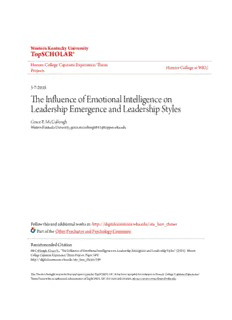
The Influence of Emotional Intelligence on Leadership Emergence and Leadership Styles PDF
Preview The Influence of Emotional Intelligence on Leadership Emergence and Leadership Styles
View metadata, citation and similar papers at core.ac.uk brought to you by CORE provided by TopSCHOLAR Western Kentucky University TopSCHOLAR® Honors College Capstone Experience/Thesis Honors College at WKU Projects 5-7-2015 The Influence of Emotional Intelligence on Leadership Emergence and Leadership Styles Grace E. McCullough Western Kentucky University, [email protected] Follow this and additional works at:http://digitalcommons.wku.edu/stu_hon_theses Part of theOther Psychiatry and Psychology Commons Recommended Citation McCullough, Grace E., "The Influence of Emotional Intelligence on Leadership Emergence and Leadership Styles" (2015).Honors College Capstone Experience/Thesis Projects.Paper 549. http://digitalcommons.wku.edu/stu_hon_theses/549 This Thesis is brought to you for free and open access by TopSCHOLAR®. It has been accepted for inclusion in Honors College Capstone Experience/ Thesis Projects by an authorized administrator of TopSCHOLAR®. For more information, please contact [email protected]. THE INFLUENCE OF EMOTIONAL INTELLIGENCE ON LEADERSHIP EMERGENCE AND LEADERSHIP STYLES A Capstone Experience/Thesis Project Presented in Partial Fulfillment of the Requirements for the Degree Bachelor of Science with Honors College Graduate Distinction at Western Kentucky University By: Grace E. McCullough ***** Western Kentucky University 2015 CE/T Committee: Approved by Dr. Amber Schroeder, Advisor Dr. Joseph Cangemi ______________________ Advisor Dr. Victoria LaPoe Department of Psychological Sciences Copyright by Grace E. McCullough 2015 ABSTRACT The aim of the current study was to determine the relationship between emotional intelligence and leadership emergence and transformational, transactional, and passive- avoidant leadership styles. Prior research has indicated that emotional intelligence is positively correlated with leader effectiveness. However, the relationship between emotional intelligence and additional aspects of leadership and leadership styles has not been thoroughly investigated. The current study hypothesized that emotional intelligence would be positively correlated with leadership emergence, and transformational and transactional leadership styles, and negatively correlated with a passive-avoidant leadership style. Additionally, it was hypothesized that leadership emergence would be positively correlated with transformational and transactional leadership styles, and negatively correlated with a passive-avoidant leadership style. The 555 full-time employed adults who made up the participants for this study completed surveys measuring their levels on each variable based on their self-reported behaviors. The results suggested that emotional intelligence is positively correlated to leadership emergence, and transformational and transactional leadership styles, and leadership emergence was positively correlated to transformation and transactional leadership styles. Emotional intelligence was also negatively correlated with passive-avoidant leadership style. There was no significant correlation found between leadership emergence and passive-avoidant ii leadership style. The findings support the use of emotional intelligence scales as a predictor of leadership behavior, and the application of these scales for employee selection and training practices in the workplace. The current study encourages future research into the subtypes of emotional intelligence and their impact on various qualities of leadership. Keywords: emotional intelligence, leadership emergence, transformational leadership, transactional leadership, passive-avoidant leadership iii Dedicated to my beloved family, friends, and WKU. iv ACKNOWLEDGEMENTS This research was made possible by WKU FUSE (Faculty-Undergraduate Student Engagement) grant #14-FA110. I would like to thank Dr. Amber Schroeder for her constant edits and advice; her assistance throughout this project has ensured its’ success. Additionally, thank you to each member of the WKU Industrial/Organizational Psychology lab for her/his encouragement in my research. I would like to acknowledge the WKU Psychology and Psychological Sciences faculty who inspired my interest in I/O Psychology and motivated my future career as a psychologist. Lastly, I would like to thank the WKU Honors College for providing me the opportunities and resources to make my education and research possible. v VITA March 24, 1993…………………………………...….Born – Louisville, Kentucky 2011……………………………………………….....International Baccalaureate Extended Essay in Psychology 2011………………………………………………….Sacred Heart Academy, Louisville, KY 2014………………………………………………….Harlaxton College, Grantham, England 2014………………………………………………....Awarded WKU FUSE Grant 2014……………………………………………..…..2nd Runner-Up WKU Homecoming Queen 2015………………………………………………...Greek Woman of the Year 2015…………………………………………………Western Kentucky University Bowling Green, KY 2015……………………………………………....…Began M.S. in Industrial/Organizational Psychology at IUPUI Indianapolis, IN PRESENTATIONS 1. McCullough, G. E. & Schroeder, A. N. (2015, February). The influence of emotional intelligence on leadership emergence and leadership styles. Thesis presented at the Kentucky Honors Roundtable Spring Conference at Kentucky State University, Frankfort, KY. FIELDS OF STUDY Major Field: Psychological Science Concentration in Applied Psychological Science Minor Field: Business Administration vi TABLE OF CONTENTS Page Abstract…………………………………………………………………………………....ii Dedication………………………………………………………………………………...iv Acknowledgements………………………………………………………………………..v Vita……………………………………………………………………………….…….....vi Chapters: 1. Introduction………………………………………………………………………..1 2. Method…………………………………………………………………………...13 3. Results……………………………………………………………………………16 4. Discussion………………………………………………………………………..17 References………………………………………………………………………………..22 Appendices………………………………………………………………………….……26 vii CHAPTER 1 INTRODUCTION “Emotions are a primary driver of human behavior. When you are blind to it, the world is a difficult and confusing place.” -Travis Bradberry, TalentSmart Our understanding and management of emotions, both our own and the emotions of others, impacts much of our daily behavior. Effectively navigating these emotions has become crucial for communication in all personal interactions today. This modern reality has encouraged the continual research and development of emotional intelligence (EI), or “the set of abilities concerned with processing emotions and emotional information” (Cote, Lopes, Salovey & Miners, 2010, p. 496). EI is based on five elements: self- awareness, motivation, self-regulation, empathy, and adeptness in relationships (Goleman, 1998). Although these elements vary slightly depending on the researcher, they can essentially be categorized into three broader aspects: our appraisal of emotion in the self and in others, our regulation of emotion in the self and in others, and using emotion in adaptive ways (Mayer & Salovey, 1989). Establishing the skills to recognize emotions and react to them in an appropriate manner is likely to ease interactions with individuals in both personal and professional settings. Biologically, our behaviors are reactions to our emotions. Our negative or positive responses to a stimulus, or emotions, provide us meaning that we use as a basis 1
Description: